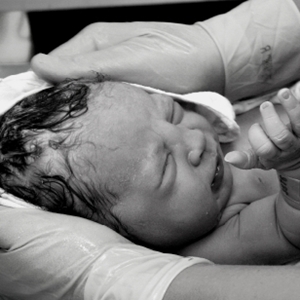
istock
Mothers in low-income countries may not understand why their babies are hospitalised after delivery, putting sick newborns at higher risk of health problems and death after being released from the hospital, a new study shows.
Forty percent of participating mothers in Ghana with sick infants had no understanding of why their child was in the hospital and another 28% had only partial understanding, according to the University of Michigan Health System study that appears in Paediatrics and International Child Health Journal. One-third of the women also reported blaming themselves for the child's illness.
"Sick newborns in low-income countries are at very high risk of adverse health outcomes," says lead author Katherine J. Gold, M.D., M.S.W., M.S., assistant professor of family medicine and of obstetrics and gynaecology at the U-M Medical School.
Parents don’t understand health issues
"Mothers who lack a clear understanding of why their infant is in the hospital might have difficulty communicating preferences about care, understanding the type of care needed, and recognising future warning signs of illness. This lack of understanding could put their baby at high risk."
Research shows that parents in low income countries often fail to recognise and seek treatment for 'red-flag' warning signs of serious illness in newborns, such as poor feeding, dehydration, lethargy, and jaundice.
Parents who don't understand their child's health issues after delivery – which may range from low birth weight to a serious infection – may have an especially difficult time recognising symptoms the baby needs treatment once families are home.
Communication gap
Authors point to factors that may contribute to the communication gap between mothers and physicians or nurses, including heavy patient volumes, very sick patients, and inadequate numbers of trained health care providers in hospitals in low-income countries. Ghana's doctor-to-patient ratio is about 1 to 10,000, compared to a ratio of 24 to 10,000 in the United States.
The workload and severity of illnesses may minimize the time physicians and nurses can spend communicating with and educating parents of hospitalized infants. Parents may not have enough education to know what to ask and in some countries, parent may feel uncomfortable asking questions directly to physicians.
"Such a setting is ripe for misunderstandings and confusion and may prevent parents from learning what to watch for when their baby goes home," Gold says.
"We need to do more work to understand the barriers of educating parents about their baby's illness to avoid preventable health problems and reduce the risk of mortality among newborns."
Forty percent of participating mothers in Ghana with sick infants had no understanding of why their child was in the hospital and another 28% had only partial understanding, according to the University of Michigan Health System study that appears in Paediatrics and International Child Health Journal. One-third of the women also reported blaming themselves for the child's illness.
"Sick newborns in low-income countries are at very high risk of adverse health outcomes," says lead author Katherine J. Gold, M.D., M.S.W., M.S., assistant professor of family medicine and of obstetrics and gynaecology at the U-M Medical School.
Parents don’t understand health issues
"Mothers who lack a clear understanding of why their infant is in the hospital might have difficulty communicating preferences about care, understanding the type of care needed, and recognising future warning signs of illness. This lack of understanding could put their baby at high risk."
Research shows that parents in low income countries often fail to recognise and seek treatment for 'red-flag' warning signs of serious illness in newborns, such as poor feeding, dehydration, lethargy, and jaundice.
Parents who don't understand their child's health issues after delivery – which may range from low birth weight to a serious infection – may have an especially difficult time recognising symptoms the baby needs treatment once families are home.
Communication gap
Authors point to factors that may contribute to the communication gap between mothers and physicians or nurses, including heavy patient volumes, very sick patients, and inadequate numbers of trained health care providers in hospitals in low-income countries. Ghana's doctor-to-patient ratio is about 1 to 10,000, compared to a ratio of 24 to 10,000 in the United States.
The workload and severity of illnesses may minimize the time physicians and nurses can spend communicating with and educating parents of hospitalized infants. Parents may not have enough education to know what to ask and in some countries, parent may feel uncomfortable asking questions directly to physicians.
"Such a setting is ripe for misunderstandings and confusion and may prevent parents from learning what to watch for when their baby goes home," Gold says.
"We need to do more work to understand the barriers of educating parents about their baby's illness to avoid preventable health problems and reduce the risk of mortality among newborns."




 Publications
Publications
 Partners
Partners









